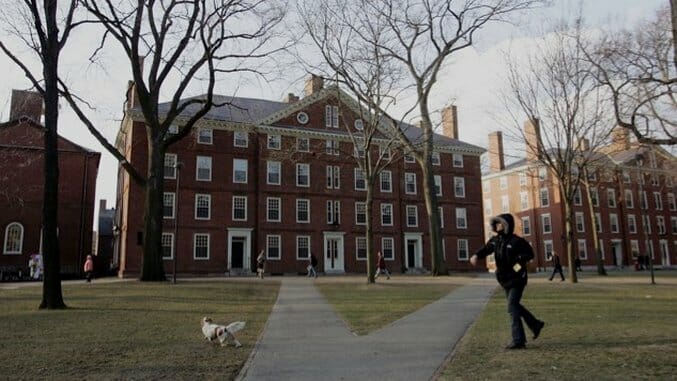Laundering Privilege: How the Harvard Crimson Killed My Chapo Trap House Interview
Photo by Joe Raedle
When Chapo Trap House announced their April 14 show at Harvard, I jumped at the opportunity to interview them for The Harvard Crimson. I was a devoted listener of the show, a longtime Weird Twitter lurker, and I was excited by the prospect of seeing their brand of iconoclasm in these hallowed halls. The interview itself went great—but my editors, who had been fully on board with my pitch, delayed and then nixed the article, citing my use of leading questions and claiming I advocated for a particular viewpoint on behalf of The Crimson.
This criticism would make sense, had I done either of those things. What’s more, these concerns were raised only after two weeks of stringing me along with delays and ignored emails. I interviewed CTH the Saturday after their show; most articles for the Arts section come out on Tuesday, and mine was edited and on schedule to do just that. When Thursday rolled around and it still wasn’t online, I emailed my editor to ask what was up. “We actually decided to publish it in our spring supplement,” she wrote me back. “It should be published [next] Tuesday!”
It was not. It had now been a week and a half since Chapo’s live show, and I was getting impatient. “Do you have a link to the piece? I can’t seem to find it,” I wrote in another email. A day and a half later, my editor responded, “The chairs [executive editors of individual boards] told me there are some concerns about the piece, so I’ll let you know what they decide.”
Four days of gritted teeth and two more unanswered emails later, I finally got a response from one of the chairs. “When I read the piece, I had some concerns about the phrasing of the questions,” she wrote. “Statements like ‘One of the most powerful things about the show is that you don’t apologize for your rage’ or ‘even on a campus as capitalist as Harvard’ seemed to indicate the views of the writer much more strongly than I felt comfortable with… We’ve decided against publishing it.”
-

-

-

-

-

-

-

-

-

-

-

-

-

-

-

-

-

-

-

-

-

-

-

-

-

-

-

-

-

-

-

-

-

-

-

-

-

-

-

-








































